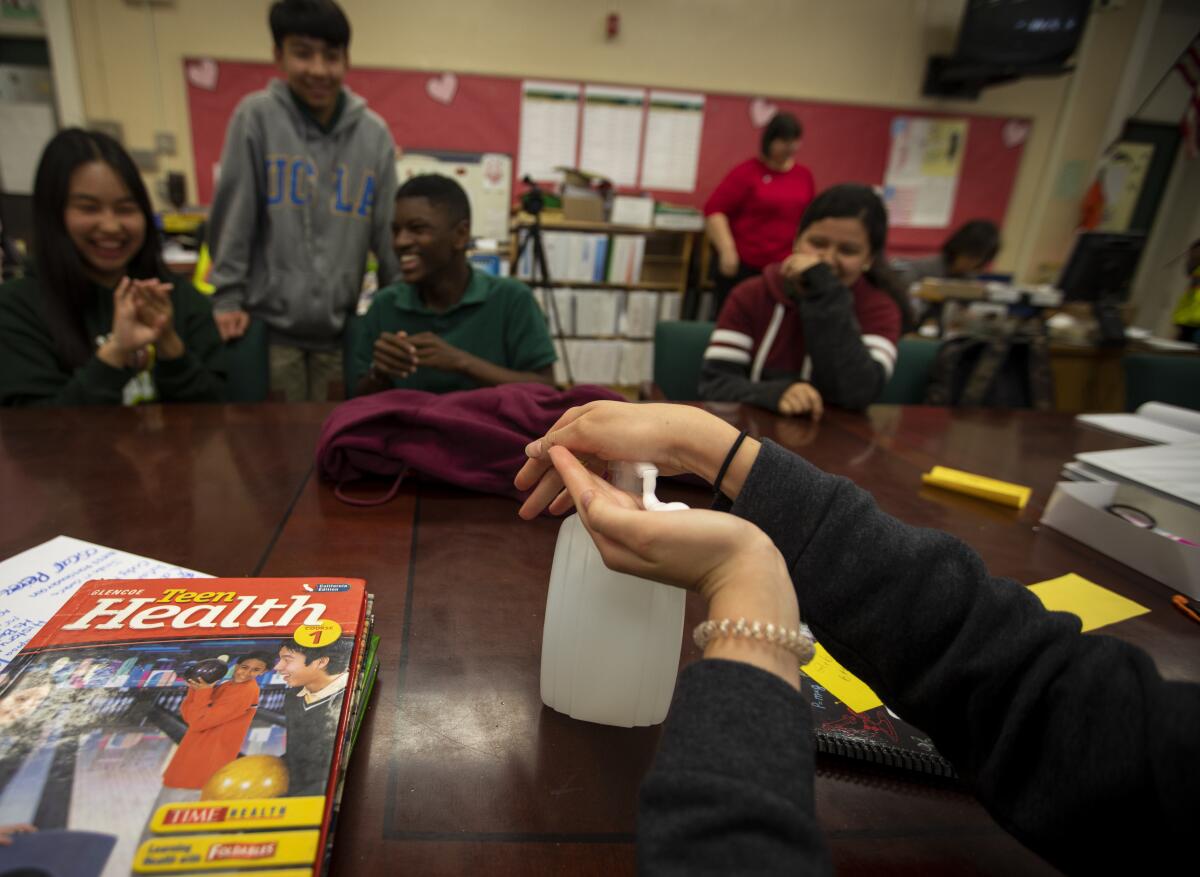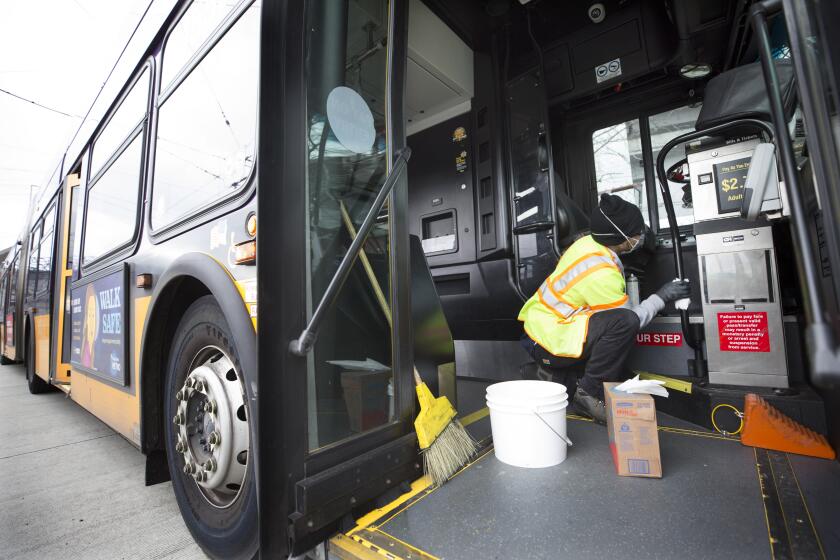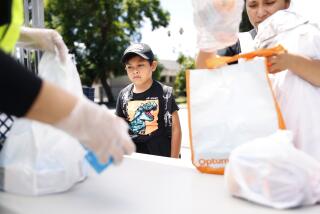Panicked parents pick up kids, try to figure out future after coronavirus school closures

- Share via
Crystal Ellis, 34, stood outside Raymond Elementary School in South Los Angeles as a light drizzle came down. She had just learned that L.A. schools were closing because of the coronavirus.
She held a white package and an iPad that the school asked her to pick up for her 11-year-old son.
“It’s a little bit scary because I don’t know what’s going to happen,” she said.
Nearby, an occasional parent rushed inside to pick up children.
“Some parents are panicking and coming in to pick up their kids,” she said.
RELATED: What parents need to know
Ellis said her son, a fifth-grader at the school, was already sick from a cold and is already at home. She recently became a stay-at-home mom and said she wouldn’t be too affected by the school district’s decision. But she said she doesn’t know what she’ll do if it means that her children will be out of school for a prolonged time. For now she just grappled with the news that schools were closing.
“There’s nothing we can do,” she said.
This was the scene playing out across L.A. and other cities as officials announced schools were closing for at least several weeks. Parents were worried about what would unfold in the coming weeks, some unprepared to help their children continue learning, others scrambling to find day care.
In Los Angeles alone, the district serves more than 670,000 children and adult students. Schools will be closed for two weeks while the situation is evaluated, said L.A. schools Supt. Austin Beutner. There will be 40 centers where students and families can receive services, including meals, starting Wednesday.
The family resource centers will be open weekdays from 6 a.m. to 6 p.m. and will offer child care and hot meals. The district hopes to have a list of locations soon. In addition, the Los Angeles district will offer televised and online lessons in an attempt to help families.
Adela Hernandez, 35, watched the washer at a laundromat spin, thinking about how she and her husband would manage their 10-year-old son who attends West Vernon Elementary school without an internet connection at home.
“Maybe I’ll ask the neighbor if they can give us access,” she said. “I’ll have to maybe pay her.”
Times were already getting hard at home. Hernandez said she’s bringing in less money because her hours at work were cut down.
“I was working five days out of the week, now just three,” she said.
How the coronavirus outbreak might affect you or your family depends heavily on where you work and live and the generosity of your employer’s benefits.
She said the clothing company based in China has reduced the number of shipments it was sending, cutting the number of workers needed.
Walking outside Augustus Hawkins High School, Nancy Ramirez, 34, made small talk with her 18-year-old daughter.
“I’m not OK with it, but if it’s for their safety, I’ll do what I have to,” she said.
Ramirez, who also has an 11-year-old daughter attending another LAUSD school, said her family does not have home computers. Her daughter said she would try and do homework on her phone or may be able to go to a relative’s house with an internet connection.
She said most students have been talking about whether they’ll be able to graduate on time. They want to know if prom will happen? Grad night?
Ramirez said she will most likely watch over her daughters in the day and go back to working nights. “It’s not easy having two kids at home,” she said.
Ramirez intends to drive an Uber from Thursday through Monday. Her ex-husband helps financially, but she fears he may lose his job because he works for a company that operates out of China.
“We gotta go to work,” she said. “We need money to pay rent and pay bills.”
Beutner provided additional information in an email to parents Friday morning that included possible help for families without computers or internet.
Students will leave school Friday with “a plan, which they will take home with them today, and additional support will be provided to assist students as they transition to a different way of learning and teachers to a different way of teaching.”
He added that some students “will be continuing the lesson plan and instruction they have already been working on with their classroom teacher.”
Others, he said, would rely on lessons provided on three local public television channels. “And for some, it will be a combination of the two,” Beutner wrote. Some services would continue to be provided for students with moderate to severe disabilities.
The district, Beutner wrote, is “developing a family resource guide that we will provide to you before Monday, to help answer your questions.”
Jenna Schwartz, 41, of Valley Village, pulled her two children out of school Thursday, because she believed school closure was imminent and wanted to prepare.
Last year, during the LAUSD teacher’s strike, Schwartz started the Facebook group “Parents Supporting Teachers,” which has since grown to more than 23,000 members. In recent days, it has become a sounding board for parents concerned about school closures. The strike helped ready parents for the possibility that schools might shutter, but, Schwartz said, this time is very different.
During the strike, many parents took their children to parks and museums and organized play dates, Schwartz said. But it’s not the same with large gatherings canceled and people practicing social distancing.
“This is actually being at home,” she said. “I think this is going to be really challenging for people. It’s going to be challenging to not sort of be like, ‘fine, watch TV.’ ”
As a stay-at-home mom, Schwartz said, she knows she has it easier than some parents, so she’s grateful that the district will provide child care centers to help parents who have to work.
Yesterday, she and her children inventoried their refrigerator, to stock up on food for the coming weeks. And on Friday, they set up a school room at home — the kids made their own desks from folding tables, and spent part of the morning searching cookbooks, picking out meals for the family as they hunker down. In the afternoon, Schwartz said she would be going to her children’s schools to pick up their assignments. After that, she said, “we’re planning, ideally, to not leave the house anymore.”
For thousands of working mothers, Friday’s school closure was foretold in a Greek chorus of group chats and social media posts, where many have scrambled to plan for what will likely be weeks of chaos.
“My mom text groups are blowing up,” said publicist Leah Goldstein, a single mother of twins. “They’re panicking.”
Thousands of preschools and home day cares are expected to follow the district’s lead, meaning the most affordable options for working parents will evaporate overnight. And while older kids may have online coursework or hobbies to keep themselves occupied as parents work from home, preschoolers, toddlers and infants need minute-to-minute attention that makes productivity nearly impossible.
“Our entire staff has been swamped with calls — it’s just been pandemonium,” said Katie Provinziano, managing director of Westside Nannies, a high-end agency serving some of L.A.’s toniest enclaves.
Provinziano said parents should plan for at least six to eight weeks of backup care — including backups for their backups if caregivers fall ill. But such care is unaffordable to many workers who need it most.
“The average rate for a nanny we’re staffing is $25 an hour. For teachers, it’s $50 or more,” Provinziano said. “Most families can’t afford that. It’s going to put families in a huge predicament, because most families cannot afford private child care.”
More to Read
Sign up for Essential California
The most important California stories and recommendations in your inbox every morning.
You may occasionally receive promotional content from the Los Angeles Times.














